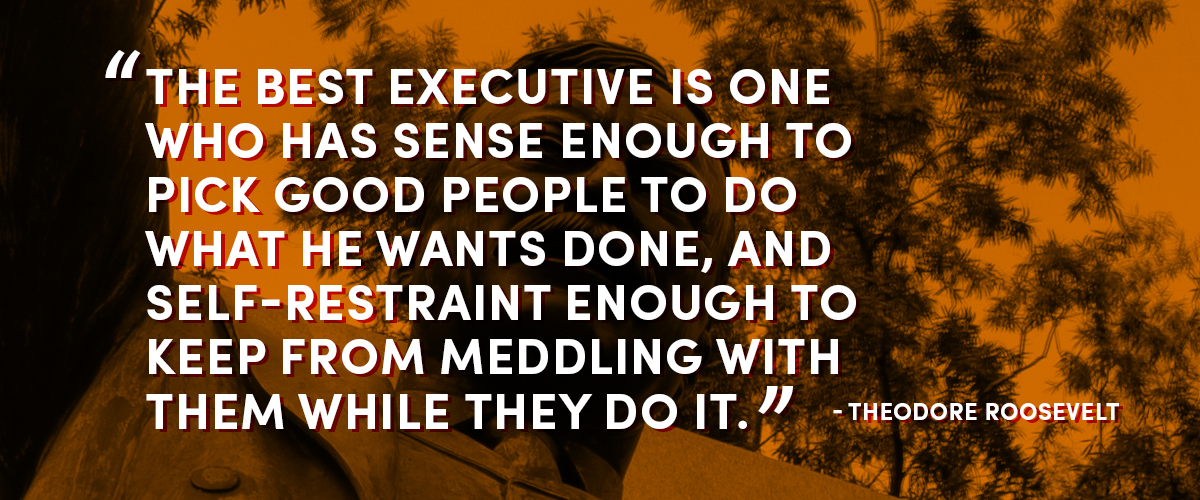“If you want something done right, do it yourself.”
Sound familiar? Admit it, we have all thought it at some point with some sense of grim satisfaction. It’s a common rhetoric in the world of management, but it's a dangerous thought pattern that can have adverse consequences within an organization. The most successful leader is one that effectively delegates tasks to team members.
We can all agree that micromanaging is bad. People don’t want to be micromanaged. It’s demoralising and demotivating. But managers micromanage because it can honestly return good short-term results.
Managers are often skilled at the job they are managing and paying close attention to details is an important part of completing projects at a high level. But micromanaging negatively impacts the growth of the team member, manager and organization as a whole. Leaders need to focus on macro details while they allow others to focus on the micro ones.

Over the last year or so, I’ve gone through some considerable professional growth. I’ve transitioned from a results driven designer/developer into the Creative Director at Brolik. Honestly, it’s been one of the most difficult challenges I’ve faced in my career. I’ve had to examine my role at Brolik and think about how I need to evolve as my responsibilities have grown.
The biggest tool I’ve begun to wield is the power of delegation, or the ability to entrust a task or responsibility to another person, usually someone who is less senior than yourself. Doing too many things at once is chaotic and inefficient. Thus, knowing when to delegate is an important skill to cultivate. Here are some of the lessons I’ve learned.

Overcoming Fear
The biggest obstacle when delegating is often yourself. Leaders must first learn to overcome the fear of giving people large responsibilities. It can be scary to relinquish control of things that you are responsible for. But ultimately, this holds back the growth of the team members that you are relying on to get the job done.
Sometimes a lack of time to adequately explain and teach somebody is an excuse for avoiding delegation. This is shortsighted, as the long term benefits of delegating far outweigh the short-term commitment. Delegating a task almost always takes longer in the beginning, but it will save countless time in the long run if done properly.

Why You Should Delegate
Your success as a manager is largely measured by the amount of quality work that your team is able to produce. By delegating, you can greatly increase the amount of quality work that you and your team can produce.
Delegation is a crucial skill to cultivate in order to become a great leader.
It will force you to learn how to develop and manage your team. Furthermore, it will allow you to focus your efforts on more high-level, strategic tasks that can help your company grow.
At an individual level, delegating tasks empowers your team to rise to the challenge and provides them with growth opportunities where they can develop their skills and abilities and grow their confidence. It also shows that you trust them, which in turns builds loyalty. Strong teams are built around trust and loyalty.
For the organization, a lack of delegation results in inefficiency as the managers and employees are both less productive. Managers are overwhelmed with the work that should be delegated, and employees aren’t challenged or empowered with their workload. This in turn limits the scalability and growth of the organization.
Proper delegation will build trust, boost morale, increase productivity and promote a culture of enthusiasm and creativity. This will decrease employee turnover and ultimately create a more valuable and successful organization.

When to Delegate
Do you struggle to finish tasks on time and take work home on nights and weekends?
If this is the case, then there is clearly too much on your plate and you need to examine the tasks that take up your time. When you have a task that needs to be completed, stop and ask yourself some more questions. It may be time to use Utah job recruiters to help you find candidates with the right skills for those tasks.
Can someone on my team complete this task?
If the answer is yes, then you should consider delegating the task. It might be frustrating that it won’t be completed the way you would have done it yourself, but you might be confusing your way with the only way. Perfection will never be achieved, so let go of that notion. Focus on the results more than the process, because there are different ways to solve the same problem.
What is the goal of this task?
You must identify what needs to be accomplished and then adequately explain those expectations. A shared vision of a successful outcome will empower the person to take responsibility and run with the task.
What does this person need to complete the task?
Make sure that your team member has the necessary skills, time, and resources to complete the task. Make sure that you have enough time to offer support for the task. Delegating without proper support is setting your team members up for failure. The amount of support needed will depend upon the capabilities and experience of the person to whom you’re delegating.
Once you’ve run through these basic questions, go ahead and fire yourself and delegate the task to the appropriate team member.
Remember
Work smarter. Not harder. Delegating is an important part of professional growth. Approach it as a skill that can be learned and improved upon. Micromanaging tasks is bad for you and your team. Focus on a shared vision of a successful outcome and the results as opposed to the process. This will set you and your team up for success, no matter what problem you are trying to solve.
